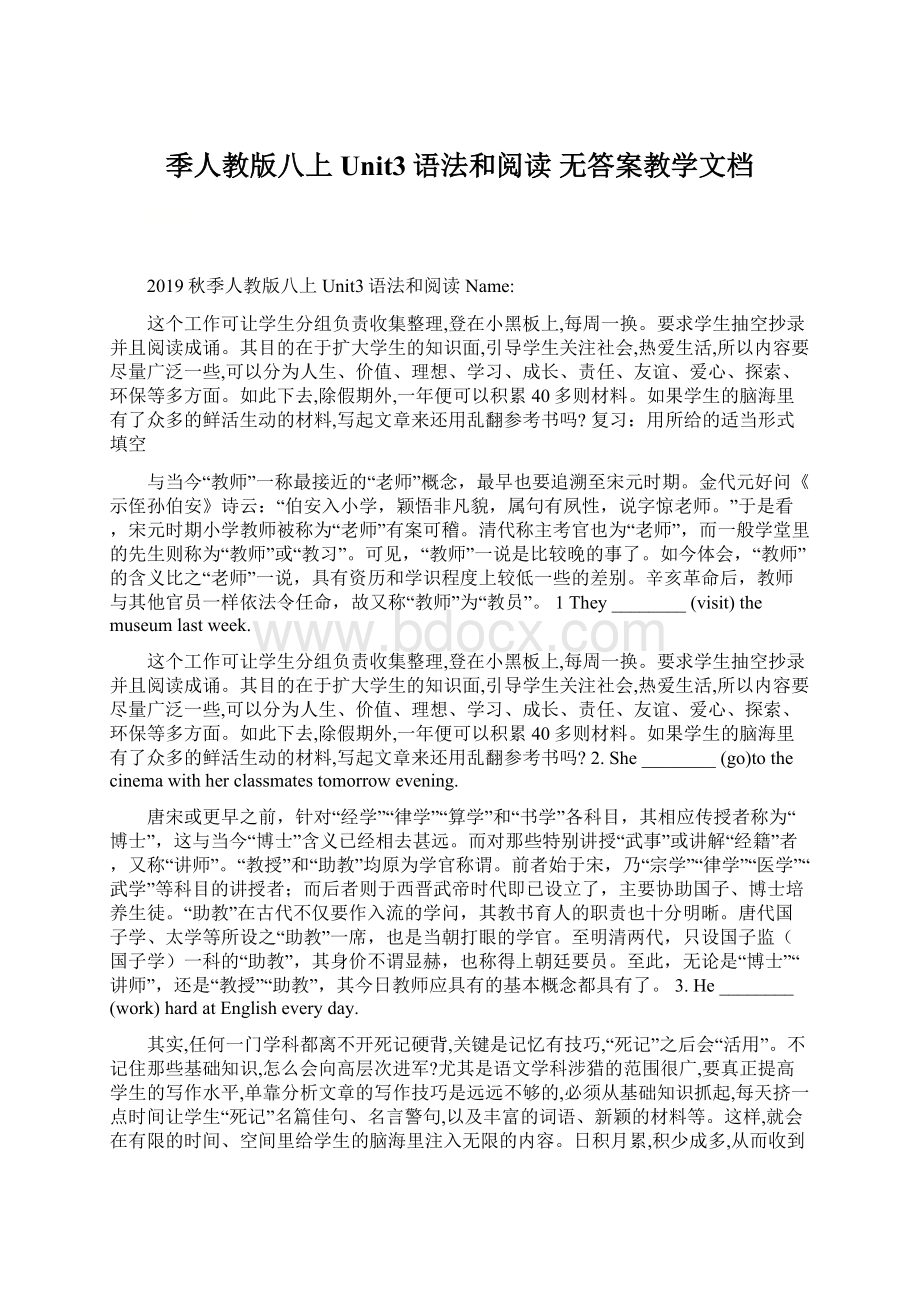季人教版八上Unit3语法和阅读 无答案教学文档.docx
《季人教版八上Unit3语法和阅读 无答案教学文档.docx》由会员分享,可在线阅读,更多相关《季人教版八上Unit3语法和阅读 无答案教学文档.docx(16页珍藏版)》请在冰豆网上搜索。

季人教版八上Unit3语法和阅读无答案教学文档
2019秋季人教版八上Unit3语法和阅读Name:
这个工作可让学生分组负责收集整理,登在小黑板上,每周一换。
要求学生抽空抄录并且阅读成诵。
其目的在于扩大学生的知识面,引导学生关注社会,热爱生活,所以内容要尽量广泛一些,可以分为人生、价值、理想、学习、成长、责任、友谊、爱心、探索、环保等多方面。
如此下去,除假期外,一年便可以积累40多则材料。
如果学生的脑海里有了众多的鲜活生动的材料,写起文章来还用乱翻参考书吗?
复习:
用所给的适当形式填空
与当今“教师”一称最接近的“老师”概念,最早也要追溯至宋元时期。
金代元好问《示侄孙伯安》诗云:
“伯安入小学,颖悟非凡貌,属句有夙性,说字惊老师。
”于是看,宋元时期小学教师被称为“老师”有案可稽。
清代称主考官也为“老师”,而一般学堂里的先生则称为“教师”或“教习”。
可见,“教师”一说是比较晚的事了。
如今体会,“教师”的含义比之“老师”一说,具有资历和学识程度上较低一些的差别。
辛亥革命后,教师与其他官员一样依法令任命,故又称“教师”为“教员”。
1They________(visit)themuseumlastweek.
这个工作可让学生分组负责收集整理,登在小黑板上,每周一换。
要求学生抽空抄录并且阅读成诵。
其目的在于扩大学生的知识面,引导学生关注社会,热爱生活,所以内容要尽量广泛一些,可以分为人生、价值、理想、学习、成长、责任、友谊、爱心、探索、环保等多方面。
如此下去,除假期外,一年便可以积累40多则材料。
如果学生的脑海里有了众多的鲜活生动的材料,写起文章来还用乱翻参考书吗?
2.She________(go)tothecinemawithherclassmatestomorrowevening.
唐宋或更早之前,针对“经学”“律学”“算学”和“书学”各科目,其相应传授者称为“博士”,这与当今“博士”含义已经相去甚远。
而对那些特别讲授“武事”或讲解“经籍”者,又称“讲师”。
“教授”和“助教”均原为学官称谓。
前者始于宋,乃“宗学”“律学”“医学”“武学”等科目的讲授者;而后者则于西晋武帝时代即已设立了,主要协助国子、博士培养生徒。
“助教”在古代不仅要作入流的学问,其教书育人的职责也十分明晰。
唐代国子学、太学等所设之“助教”一席,也是当朝打眼的学官。
至明清两代,只设国子监(国子学)一科的“助教”,其身价不谓显赫,也称得上朝廷要员。
至此,无论是“博士”“讲师”,还是“教授”“助教”,其今日教师应具有的基本概念都具有了。
3.He________(work)hardatEnglisheveryday.
其实,任何一门学科都离不开死记硬背,关键是记忆有技巧,“死记”之后会“活用”。
不记住那些基础知识,怎么会向高层次进军?
尤其是语文学科涉猎的范围很广,要真正提高学生的写作水平,单靠分析文章的写作技巧是远远不够的,必须从基础知识抓起,每天挤一点时间让学生“死记”名篇佳句、名言警句,以及丰富的词语、新颖的材料等。
这样,就会在有限的时间、空间里给学生的脑海里注入无限的内容。
日积月累,积少成多,从而收到水滴石穿,绳锯木断的功效。
4.Putonyourcoat.Thewind________(blow)hardoutsidenow.
5.________you________(get)upearlyeverymorninglastyear?
6.Theearth________(move)aroundthesun.
7.Allthestudents________(plant)treestomorrow.
8.Look!
TheYongPioneers________(pant)treesonthehill.
9.MrWang________(notgive)usatalklastMonday.
10.Weoften________(have)anEnglishpartyonSaturdayevenings.
11.Tomalways________(think)muchofothers,butlittleofhimself.
12.MrBlack,togetherwithhisstudents,________(visit)theScienceMuseumnow.
13.There________(be)aLeaguemeetingthedayaftertomorrow.
14.—What'sinthelake?
—Someboys________(swim)inthelake.
15.MybrotherlikesEnglishverymuch,andhe_________(practice)readingeverymorning.
单项选择:
(1)–Doyouoftengofishingwithyourfather?
–No,_______.Idon’tlikefishingatall.
A.neverB.alwaysC.usuallyD.sometimes
(2)–Doyouoftengotothegym?
–Yes,________.Ilikesportsverymuch.
A.alwaysB.neverC.sometimesD.hardly
(3)I________gotothetheatre,becauseIdon’tlikeoperasatall.
A.alwaysB.oftenC.sometimesD.never
(4)Hesayshewillcometoseeustomorrowafternoon.
A.sometimeB.sometimeC.sometimesD.sometimes
(5)Speakaloud,please!
Ican_____hearyou.
A.almostB.hardlyC.usuallyD.sometimes
(6)Mycousinwantstokeepslim.Shedoesexerciseeverymorningand__eatsmeat.
A.hardlyB.alwaysC.usuallyD.often
(7)—MissZhouisverypopularwiththestudents.
—Yes.Herclassesare_________livelyandinteresting.
A.alwaysB.sometimesC.hardlyD.never
(8)—HaveyoueverbeentoDisneyland?
—No,______.IhopeIcangotherenextyear.
A.alwaysB.sometimesC.neverD.often
(9)—ZhangLili,"themostbeautifulteacher",hasmovedusdeeply.
—Yes,andsheis__________popularwithherstudents.
A.sometimesB.neverC.alwaysD.hardly
(10)Idon’tthinkfastfoodisgoodforourhealth,soI_______gotoMacDonald.
A.hardlyB.alwaysC.usuallyD.often
语法学习:
形容词是用来修饰名词或不定代词,说明事物和人的性质和特征的一类词,在句子中用作定语、表语、宾语补足语;而副词用以修饰动词、形容词或其他副词,在句子中作状语、表语、补语和定语。
英语中的形容词和副词都有等级的变化。
1.形容词的位置
形容词作定语通常前置,但在下列情况中后置:
修饰some,any,every,no和body,thing,one等构成的复合不定代词时
someonespecial,everythingpossible
以-able,-ible结尾的形容词可置于有最高级或only修饰的名词之后
thebestbookavailable,theonlysolutionpossible
alive,alike,awake,asleep等可以后置
theonlypersonawake
表示长、宽、高、深及年龄的形容词
abridgeof50meterslong
形容词短语一般后置
amandifficulttogetonwith
else修饰疑问词和不定代词时
whatelse,somethingelse
特例清单:
1.有些形容词只能作定语。
如:
little(小的),only(唯一的),wooden(木质的),elder(年长的),等及复合形容词man-made(人造的),kind-hearted(好心的),E特lish-speaking(说英语的),take-away(可以带走的)等。
2.有些形容词只能作表语。
如:
alone(孤独的),asleep(睡着的),awake(醒着的),alive(活着的),well(健康的),ill(病的),frightened(害怕的)等。
3.有些形容词貌似副词。
如:
friendly(友好的),lively(生动的),lonely(孤独的)等。
4.有些形容词与定冠词the连用,表示一类人或物。
如:
Weshouldrespecttheoldandlovetheyoung.我们应该尊老爱幼。
It’snotpolitetolaughattheblindorthedeaf.取笑盲人或聋人是不礼貌的。
5.enough修饰名词时既可以放在名词的前面,也可以放在其后面;然而,enough作状语修饰形容词或副词时,应该放在形容词或副词之后。
如:
Wehaveenoughtime/timeenoughtofinishthework.我们有足够的时间来完成这项工作。
Heranfastenoughtocatchthebus.他跑得很快,足够赶上公共汽车了。
Thishallisbigenoughtohold1,000people.这个大厅够大,可以容纳1000人。
6.多个形容词作定语时,通常按“性质→大小(长短、高低、形状等)→年龄/新旧→颜色→国籍(地区、出处等)→材料”的顺序排列。
如:
abeautifultallbuilding一座漂亮而高大的建筑物;alargeyellowChinesecoat一件黄色的中国式大衣
题组训练:
形容词的作用及位置
1.Mom,I’mvery______forallyourlove.
A.thankfulB.carefulC.usefulD.helpful
2.Mom,I’vecookedtheegg.What______canIdoforyou?
A.otherB.anotherC.thingD.else
3.ThehitofiPhone6madethefansofit______.
A.excitingB.excitedC.disappointmentD.disappointing
4.Shewas______enoughtogetoutofthebuildingbeforeitfelldown.
A.happyB.luckyC.lovelyD.quickly
5.—WhydoyoulikeMrs.Lee?
—Becauseshe’s______.Sheisnevertiredofexplainingsomethingtousagainandagain.
A.activeB.beautifulC.unusualD.patient
6.Iloveallmystudents.Ithinkeachofthemis______.
A.earlyB.luckyC.lovelyD.interesting
7.Davidisnever______!
Hecan’tstoptalking.
A.quietB.athleticC.outgoingD.smart
8.Ihavemade______newfriendsherethatIreallyenjoymyschoollife.
A.somuchB.somanyC.suchmuchD.suchmany
2.副词的分类
时间副词
soon,now,early,finally,once,recently
频度副词
usually,always,often,hardly,seldom,never
地点副词
here,nearby,outside,upwards,above
疑问副词
how,where,when,why
方式副词
hard,well,fast,
slowly,excitedly,really
连接副词
how,when,where,why,whether,however
程度副词
almost,nearly,very,fairly,quite,rather
关系副词
when,where,why
注意:
地点副词、时间副词和方式副词放在句尾,它们同时出现时的顺序是:
方式副词→地点副词→时间副词。
如:
Thestudentsaredoingtheexperimentscarefullyinthelabnow.同学们现在正在实验室里认真地做实验。
Manypeopletakeexercisehappilyonthesquareeverymorning.很多人每天早晨在广场上高兴地进行锻炼。
题组训练:
副词的作用及位置
9.ThemoviecoversallofChinesehistory.Itis______worthseeingagain.
A.mainlyB.reallyC.possiblyD.hardly
10.Mr.Liisakindteacher,buthetreatedus______.
A.politelyB.friendlyC.strictlyD.lively
11.Tony,passmyglassestomeplease.Ican______seeyour
friendsclearly.
A.reallyB.actuallyC.hardlyD.nearly
12.IwillrememberMr.Liforeverbecausehealwaystakestimetoexplainthingstome
______.
A.clearlyB.hardlyC.stronglyD.quickly
13.—LiLihasimprovedherEnglishalotsinceshejoinedtheEnglishclub.
—How______shechosetojoinitatfirst!
A.quicklyB.suddenlyC.simplyD.wisely
14.FrankisplayinghisiPhone______,buthisfatherlooksangry.
A.happyB.happilyC.sadD.sadly
15.Look,yourclothesarewetthrough.Itmustberaining______.
A.loudlyB.hardlyC.heavilyD.clearly
16.—Mr.Smith,wouldyoupleasespeakalittle______?
—Sorry!
Ithoughtyoucouldfollowme.
A.quietlyB.politelyC.seriouslyD.slowly
17.Inthesouth,peoplelive______onrice.
A.mostB.mostlyC.almostD.more
3.规则变化的形容词和副词的比较级和最高级
构成方法
原级
比较级
最高级
一般单音节词末尾加-er,-est。
small
fast
smaller
faster
smallest
fastest
以不发音的e结尾的单音节词加-r,-st。
nice
fine
nicer
finer
nicest
finest
以辅音字母+y结尾的双音节单词,先把y变为i,再加-er,-est。
early
happy
earlier
happier
earliest
happiest
以一个辅音字母结尾的重读闭音节的单词,双写末尾的字母再加-er,-est。
red
big
thin
redder
bigger
thinner
reddest
biggest
thinnest
部分双音节词或多音节词在原级前加more,most。
interesting
important
moreinteresting
moreimportant
mostinteresting
mostimportant
特例清单
1.使用比较级时,在对比中应该是同类进行对比。
如:
“我的英语不如你的好”应译成“MyEnglishisnotas/sogoodasyours.”,而不能译成“MyEnglishisnot特sgoodasyou.”。
因为此句中比较的对象是English,而不是you,所以要把you改成yours(=yourEnglish)。
2.使用比较级时,切忌一方包含另一方,从而造成自身与自身的比较。
如:
“她比她班上任何同学学习都努力”应译成“Shestudiesharderthananyotherstudentinherclass.”,而不能译成“Shestudiesharderthananystudentinherclass.”。
anystudentinherclass包括she,使用了other才能将其排除。
题组训练:
18.ManypeopleprefertoshopontheInternet.It’s______.
A.cheapB.cheaperC.cheapestD.lesscheap
19.Look!
Ourhometownis______nowthanitusedtobe.
A.quitebeautifulB.themostbeautifulC.verybeautifulD.muchmorebeautiful
20.Lucy’shandwritingis______inourclass.Wemustlearnfromher.
A.beautifullyB.morebeautifulC.mostbeautifulD.themostbeautiful
21.Ican’taffordthisexpensivecoat.Canyoushowmea_____one?
A.cheaperB.higherC.lowerD.dearer
22.—Haveyoueverseenthefilm?
—Sure.It’soneof______filmsIhaveeverseen.
A.themostwonderfulB.wonderful
C.muchwonderfulD.themorewonderful
23.—Howdidyoulosethesoccermatch?
—Wehad______players.Theyhadelevenwhilewehadonlyten.
A.fewerB.lessC.moreD.better
24.Wateristhecheapestdrink.Andit’salso______.
A.healthierB.healthiestC.thehealthierD.thehealthiest
25.Thetrainhasjustleft.Weshouldgethere10minutes______.
A.earlierB.theearliestC.theearlierD.early
4.不规则变化的形容词和副词的比较级和最高级
原级
比较级
最高级
Good/well
better
best
Bad/ill/badly
worse
worst
little
less
least
Many/much
more
most
far
farther/further
Farthest/furthest
old
older/elder
oldest/eldest
26.Mybikebrokedownhalf-wayandIhadmy______experience
thatday.
A.worstB.bestC.theworstD.thebest
27.—Isyourheadacheget